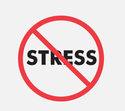The stress response is the collection of changes that our mind and body goes through to handle the stress we are facing, and then the changes we go through to return to normal after the stressor is gone.
Fight! Flight! Freeze!
It doesn’t matter whether it’s a physical, mental or emotional stressor. It doesn’t matter if it’s a threat, challenge or change. It doesn’t matter if the stressor is a survival stressor, tolerable or chronic. The response our bodies and minds go through to deal with it is the same.
Everything that happens in our mind and body is designed to help us survive and/or handle what we are facing.
Our bodies release hormones—adrenaline and noradrenaline, or epinephrine and norepinephrine to increase:
- Heart rate
- Breathing rate
- Blood pressure
- Metabolic rate
- Blood flow to muscles.
All these things are necessary for dealing with the stress. Fighting, fleeing or freezing are all survival strategies that we have learned over the course of human history. Sometimes fighting is the best way to handle the stressor. Sometimes running is. And sometimes freezing is. In modern times, with more mental and emotional stressors, we can’t fight, run or hide from our challenges. So instead, we have to adapt or adjust.
Our mind goes through very fast calculations to help us decide which is best.
In addition, all those other body and mind functions that we don’t need for immediate survival slow down.
For example, systems involved with the following would not function well: This is why, for example, it is hard to learn something new when we are experiencing a stress response. Our mind is occupied with survival strategies. Learning something new would use a different part of the brain and when stressed, that part isn’t functioning as well as when we are relaxed. Any process in our body that isn’t immediately needed for survival slows down.
Examples:
- Digestion
- Immunity
- Reproduction
- Long term decision making/problem solving
As soon as we perceive a stress, we go into ALARM MODE. Basically, our mind almost instantaneously tells our body,
“Hey, you better get ready to fight! Or Run! Or freeze!
And then, when the stress is gone, our mind tells our body,
“Okay, it’s over. You can go back to normal now!”
This stress response is automatic. We don’t have to plan it. As soon as our mind perceives a stressor-there we go- into a stress response.
This is the stress response.
- Become aware of a threat, challenge or change.
- Go into fight/flee/freeze mode.
- Cope with stressor. Either fight, flee, freeze, adapt/adjust.
- Go back to normal.
How strong/big is the stress response?
You’d maybe think that the bigger the threat, challenge or change the bigger the stress response.
Not completely true.
There are two things that matter.
- How close is the stressor. This could be in time or distance.
- Do we think we can handle it! How we perceive the stress helps determine how strong our stress response.
Another thing that makes a stress response smaller is if we have support. If a friend, or parent or mentor or counselor-anyone really trusted-offers us emotional support when we are dealing with a stressor, then our stress response tends to be smaller than if we had to handle it without support or if someone made it worse by teasing us or adding to our stress somehow.
The stress response is automatic.
When confronted with a threat, challenge or change, our body and mind automatically respond. We don’t have to say to ourselves,
No. As soon as we perceive a threat, challenge or change, our body and mind automatically go into a stress response.
Chronic vs. Acute Stress Response: Why We Need Relaxation
Once a stress is gone, our body and mind go back to a normal, balanced state. When we have successfully dealt with the threat, challenge or change, our body and mind get the signal:

OKAY TO STOP STRESS REPONSE. STRESS GONE. ALL OKAY!
It can take awhile to feel completely normal, but we will get there.
Sometimes we go back to normal easily. This depends on whether we are dealing with a chronic or acute stress response.
If the stress is short lived (acute); if it happens and is resolved pretty quickly, then yes—we recover pretty quickly.
But if the stress is chronic, then we constantly are having a stress response.
We never get the signal that the stressor is gone, because it never is gone. Either the situation doesn’t end, or else we continue to worry and worry and worry.
This is where the Relaxation Response comes in.
If we don’t get the signal that the stress is gone we have to take action to stop the stress response. We have to decide to trigger a Relaxation Response. Learn more in our Strategies and Techniques section >>
